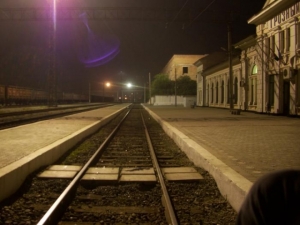High-speed Railway from Krasnodar to Grozny
Ramzan Kadyrov, Head of the Chechen Republic, has asked President Vladimir Putin for money to build a high-speed railway that would link Rostov-on-Don, Krasnodar, and all the republics of the North Caucasus. The project, although interregional, will certainly be linked to the name of the Chechen leader.
On June 25, the eve of the appointment of a new ambassador to the North Caucasus, Kadyrov sent a letter to the Russian President with proposals for a ‘Strategy for Spatial Development of the Russian Federation until 2025.’ This document is now being developed by the government as part of fulfillment of a Presidential Decree on ‘National Purposes and Strategic Development Challenges of the Russian Federation.’ The project will increase the capacity of railway approaches to the seaports of the Azov-Black Sea basin. Within the decreed project, Russian Railways began to work on the construction of high-speed highways Moscow - Novorossiysk (freight) and Moscow - Adler (passenger).
Ramzan Kadyrov proposes to build a branch from Rostov-on-Don, which will connect Krasnodar, Maikop, Mineralnye Vody and the capitals of the republics of the North Caucasus. It must also pass through Grozny, and finish in Makhachkala.
The cost of Kadyrov’s project is well over 1 trillion Rubles. Its economic efficiency, however, raises big questions: will such a quantity of cargo and passengers be sent to the Caspian Sea? For Kadyrov, however, the political effect of the request is just as important as the potential economic gains.
To date, many projects have been implemented in Chechnya at the expense of the state budget. 25 billion Rubles was the price of construction of the Groznenskaya TPP, the first power unit of which is planned to be launched in December (financed by Gazprom).
Another 16 billion is the price of reconstruction of the international airport in Grozny, which is already included in the state program ‘Development of the Transport System.’
Experts doubt the economic feasibility of the high-speed highway Krasnodar - Grozny. According to their estimates, the cost is an unbearable sum for the budget and state-owned companies. At the same time, Chechnya remains one of the leaders in terms of the volume of non-repayable cash injections. This year, according to the Russian Ministry of Finance, Chechnya will receive 27 billion Rubles of subsidies from the federal budget.
By Dimitri Dolaberidze












